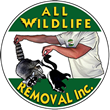Finding out you have a raccoon on the property is never fun. These big critters leave their mark, from their nests and food scraps to damaged property. But the most annoying and dangerous problem associated with raccoons is the feces they leave behind.
Do you need wildlife removal services? Request a quote today!
To keep family and pets from contracting one of the many harmful diseases in raccoon poop, you need wild animal removal services. Here’s why.
The Dangers
 Raccoon feces is host to a number of dangerous bacteria and parasites that can make anyone in the homesick. Raccoon roundworm is the most common disease. The worm itself lives in the raccoon’s intestines, and its eggs appear in the feces. Exposure comes from contact with the animal’s latrine.
Raccoon feces is host to a number of dangerous bacteria and parasites that can make anyone in the homesick. Raccoon roundworm is the most common disease. The worm itself lives in the raccoon’s intestines, and its eggs appear in the feces. Exposure comes from contact with the animal’s latrine.
Salmonella is another common disease found in raccoon droppings. It often remains dormant for a long time, activating only when conditions improve, such as when it can latch onto a new host.
Giardia is highly contagious and infects any surface it comes in contact with. If raccoon poop carrying this disease comes into contact with water puddles or soil, the entire area is contaminated.
The high risk of contracting these diseases emphasizes the importance of having wild animal removal services handle cleanup and decontamination.
Spotting Raccoon Poop
Raccoons frequent the same spot for their bathroom breaks, commonly called the “latrine site.” A raccoon’s latrine site is usually a large pile of poop, accompanied by a visible wet spot. The best way to identify whether or not it’s raccoon excrement yo have encountered is by its size. Raccoons are amongst the largest urban pests commonly encountered, therefore it stands to reason that their feces will also be the largest. But just because the evidence left behind is larger than what would have been left by a rodent, does not necessarily mean you have found raccoon poop. there are other large animals as well as household pets that could be responsible for the mess. So, once you have determined based on size that it is larger than a rodent or squirrel, then next consideration is location.
Raccoons will defecate n different areas than your household pets, this is the next best indicator to help determine what animal you are dealing with. Raccoon latrine spots are generally found near tree bases, stumps, garages, under decks, and in attics.
Please see the picture below of some raccoon feces, this will help you in the identification process:

Better Left to the Professionals
Cleaning up raccoon poop without the proper tools and disposal materials can be risky. While it’s a job best left to wild animal removal services, feces left in an area with a high risk of someone coming into contact with it requires swift removal.
Purchase disinfection compounds and parasite-killing solutions to effectively remove droppings, and wear protective clothing and equipment to avoid contact with any of these diseases. Feces that isn’t properly disposed of is likely to grow bacteria, as well as attract insects and future animals.
Preventative Measures
There are some preventative measures homeowners can put in place. Raccoons’ sensitive paws leave them with a strong dislike of plastic materials, and they’re likely to avoid walking across these kinds of surfaces. Cover their latrine sites in a few sheets of this to keep them out. Leaving the site covered for a few weeks will give them the hint to find a new space.
For poop found on decks or patios, regularly moving the furniture around will deter the raccoon from getting too familiar with one spot and force it to go elsewhere.
Overwater the lawn or garden so it stays wet and muddy. Nobody wants to go to the bathroom in a space that’s uninhabitable. Once the raccoon has left, cease the overwatering.
Why You Need Wild Animal Removal Services
Finding raccoon poop on the property is often a sign of a bigger problem: raccoons living in the home. It’s best to enlist the help of wildlife removal experts with the experience and knowledge to stop this problem and fix it for good.
Disposing of raccoon feces requires careful handling, and wildlife removal professionals have the means to do so. They’ll safely remove anything that may have come in contact with droppings, disinfect all materials, and provide measures to keep future raccoons out.
Don’t expose yourself to this danger—use professional raccoon removal services to make your home safe again.
Do you need wildlife removal services? Request a quote today!
